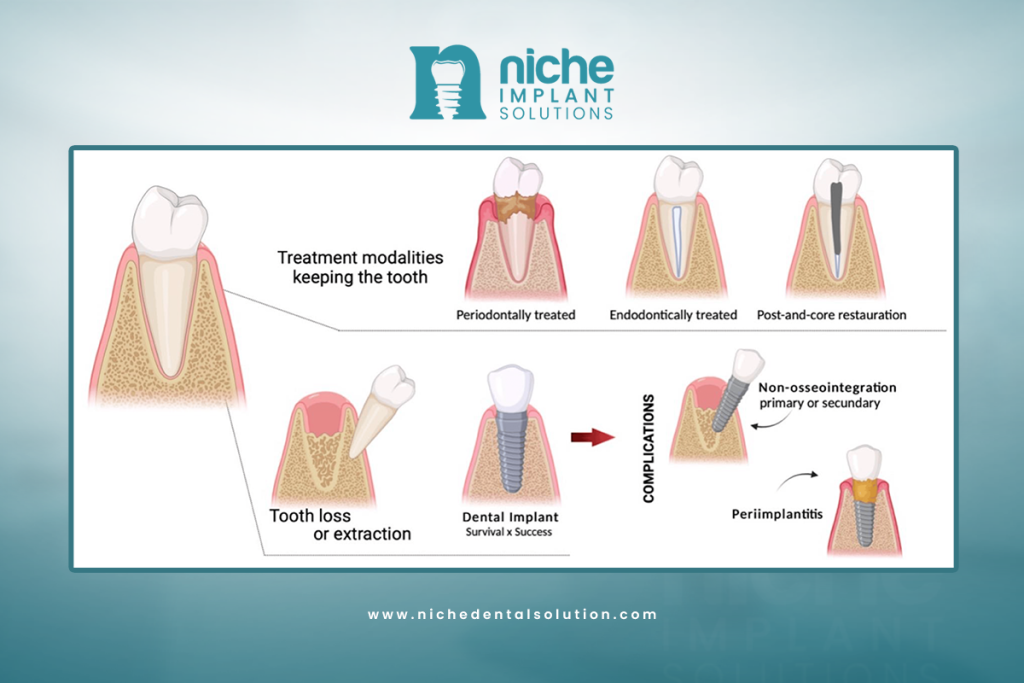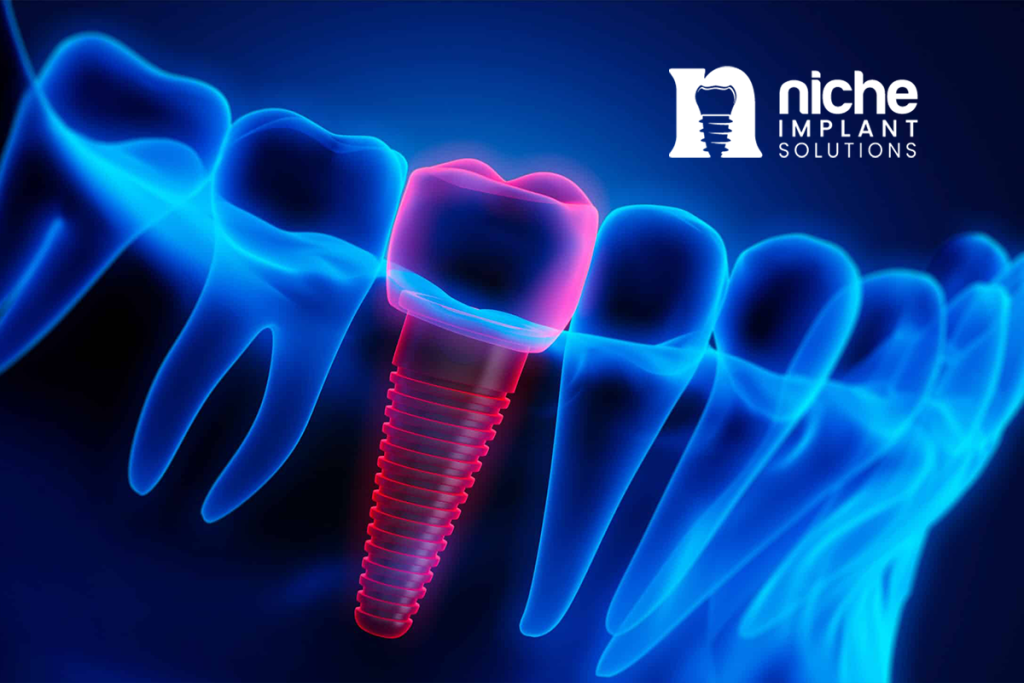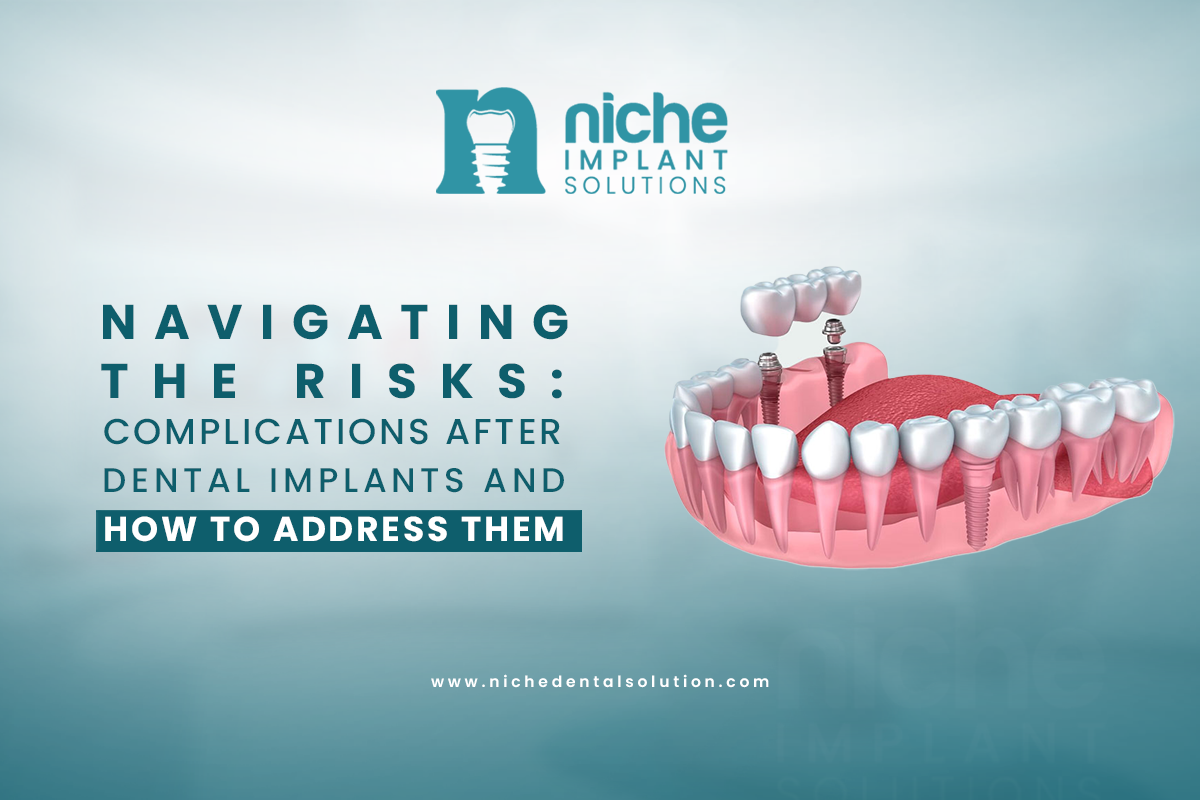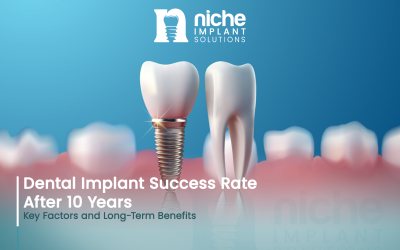Dental implants have transformed restorative dentistry by providing a durable and attractive solution for missing teeth. While many patients achieve successful results, complications after dental implants can occur, leading to discomfort or even implant failure. It’s important for anyone considering implants to understand these potential risks. This article will discuss common complications after dental implants, their causes, and effective prevention and management strategies. By staying informed, patients can confidently navigate their dental journey and make empowered decisions about their oral health.
Understanding Risk Factors for Complications After Dental Implants
Dental implants are an effective way to replace missing teeth, but various risk factors can impact their success. Knowing complications after dental implants and their factors helps patients make informed decisions and take proactive steps for better outcomes.
Common Risk Factors
Smoking
Smoking impairs blood flow, hindering healing and increasing infection risk. Smokers may experience higher implant failure rates.
Recommendation: Quitting smoking before surgery and during recovery can improve outcomes.
Diabetes
Poorly controlled diabetes can impede healing and raise infection risks, leading to higher rates of complications.
Recommendation: Maintaining good blood sugar control is essential before and after the procedure.
Poor Oral Hygiene
Inadequate oral care can lead to plaque buildup, increasing the likelihood of infection and implant failure.
Recommendation: Patients should follow a strict oral hygiene routine and schedule regular dental check-ups.
Bone Density Issues
Low bone density can affect implant stability. Insufficient bone support may lead to failure.
Recommendation: Bone grafting may be necessary to enhance bone density before placement.
Age and General Health
Older patients or those with health issues may face greater risks during recovery.
Recommendation: Comprehensive health assessments and communication with healthcare providers are crucial.
Medications
Some medications can interfere with healing, impacting implant success.
Recommendation: Patients should discuss all medications with their dentist to manage potential risks.
Understanding and addressing these risk factors—such as smoking, diabetes, and poor oral hygiene—are vital for ensuring the success of dental implants. By taking proactive steps and consulting dental professionals, patients can enhance their chances for a successful implant experience.

Recognizing Symptoms of Complications After Dental Implants
Dental implants are a popular and effective solution for replacing missing teeth, offering a natural appearance and improved functionality. While many patients enjoy successful outcomes, it’s crucial to be aware of the complications after dental implants that can arise after the procedure. Recognizing the symptoms of these complications early can make a significant difference in treatment outcomes.
Common Symptoms of Complications
Pain and Discomfort
While some complications after dental implants are expected, persistent or worsening pain could be a sign of a complication. Normal post-operative pain usually subsides within a few days, but if it intensifies or doesn’t improve, it may indicate an issue such as infection or implant failure.
What to Watch For: If pain is severe or accompanied by other symptoms, such as swelling or fever, it’s essential to contact your dentist immediately.
Swelling and Inflammation
Mild swelling around the implant site is a normal part of the healing process. However, significant or prolonged swelling may suggest an underlying problem, such as an infection or an inflammatory response.
What to Watch For: If the swelling extends beyond the implant site or lasts longer than expected, it’s important to seek professional evaluation.
Bleeding
Some bleeding is normal after implant placement, especially in the first 24 hours. However, excessive or continuous bleeding may indicate a complication. If the bleeding does not subside with basic home care, such as biting on gauze, it may require professional intervention.
What to Watch For: Persistent bleeding or blood in saliva days after surgery warrants immediate consultation with a dentist.
Mobility of the Implant
A dental implant should feel stable and secure. If you notice any movement or looseness of the implant, this could be a sign of implant failure or inadequate osseointegration (the process by which the implant fuses with the jawbone).
What to Watch For: Any sensation of the implant moving should prompt an urgent visit to your dental professional.
Changes in Bite or Alignment
If you experience changes in your bite or notice that your teeth feel misaligned, it could indicate a complication. This may result from shifting of the implant or surrounding teeth.
What to Watch For: Discomfort or difficulty while chewing, along with misalignment, should be evaluated by your dentist.
Gum Issues
Healthy gums should be firm and pink around the implant. If you notice redness, swelling, or bleeding of the gums, it may indicate a condition called peri-implantitis, which involves inflammation of the tissues surrounding the implant.
Also read: Smile Brighter: Discover the Superior Benefits of High-Quality Dental Implants
What to Watch For: Persistent gum issues that do not resolve with improved oral hygiene require professional evaluation.
Fever and Systemic Symptoms
Fever or systemic symptoms like fatigue and malaise can indicate a more serious infection. If you develop a fever after receiving an implant, it’s crucial to seek medical attention promptly.
What to Watch For: A fever above 100.4°F (38°C) or any significant changes in your overall health following implant surgery should not be ignored.
While dental implants can provide a life-changing solution for missing teeth, it’s essential to be vigilant about complications after dental implants. Recognizing the symptoms—such as persistent pain, swelling, bleeding, implant mobility, changes in bite, gum issues, and systemic symptoms—can help you seek timely intervention and improve outcomes. If you experience any of these signs after your dental implant surgery, don’t hesitate to reach out to your dental professional. Early detection and management are key to ensuring the long-term success of your dental implants.

Short-Term vs. Long-Term Complications After Dental Implants
Dental implants are an effective solution for restoring missing teeth, but they come with potential risks. Understanding short-term and long-term complications after dental implants can help patients monitor their recovery and ensure a successful outcome.
Short-Term Complications
complications after dental implants typically occur within weeks of surgery:
Pain and Discomfort
While some pain is normal, severe or increasing pain may indicate an infection or improper placement.
Management: Follow post-operative care instructions and consult a dentist if pain worsens.
Swelling and Bruising
Mild swelling is expected, but excessive swelling could signal complications.
Management: Use ice packs and elevate the head; persistent swelling should be evaluated.
Infection
Signs include increased pain, swelling, and discharge at the implant site.
Management: Maintain good oral hygiene and seek prompt treatment if infection is suspected.
Bleeding
Some bleeding is normal, but prolonged or excessive bleeding may require attention.
Management: Bite on gauze to control bleeding; contact a dentist if it persists.
Long-Term Complications
These may develop months or years after placement:
Peri-implantitis
This inflammatory condition can lead to bone loss around the implant.
Management: Regular dental check-ups and good hygiene are key. Treatment may involve deep cleaning.
Implant Failure
Factors like insufficient bone density or excessive force can cause failure.
Management: Regular monitoring is essential. In cases of failure, removal and possible bone grafting may be needed.
Gum Recession
Over time, gum tissue may recede, affecting aesthetics and health.
Management: Good oral hygiene and check-ups can help monitor gum health. Gum grafting may be necessary in severe cases.
Changes in Bite or Jaw Function
Misalignment can occur due to shifting teeth or bone loss.
Management: Regular check-ups can help identify issues early. Orthodontic adjustments may be required.
Recognizing both short-term and long-term complications after dental implants is crucial for dental implant patients. By adhering to care guidelines, maintaining oral hygiene, and attending regular dental visits, patients can reduce risks and enhance the longevity of their implants. If any concerning symptoms arise, seeking prompt dental care is essential for ensuring a successful outcome.
Post-Implant Care Tips from Niche Dental Solutions
Successfully receiving dental implants is just the first step toward a healthy smile. Proper post-implant care is essential to ensure long-term success and maintain oral health and will protect you from complications after dental implants. Here are some valuable tips from Niche Dental Solutions to help you care for your implants after surgery.
Follow Your Dentist’s Instructions
Your dentist will provide specific post-operative care instructions tailored to your needs. Follow these guidelines carefully to promote healing and avoid complications.
Maintain Good Oral Hygiene
- Brush Gently: Use a soft-bristled toothbrush to clean your teeth and the implant site. Brush twice a day, but be gentle to avoid irritating the gums.
- Floss Daily: Use unwaxed dental floss or interdental brushes to clean between your teeth and around the implant. This helps prevent plaque buildup.
Avoid Certain Foods
In the initial healing phase, avoid hard, crunchy, or sticky foods that could disturb the implant site. Stick to soft foods for the first few weeks, gradually reintroducing your regular diet as you heal.
Stay Hydrated
Drink plenty of water to keep your mouth hydrated. This helps in maintaining saliva production, which is crucial for oral health.
Avoid Smoking
Smoking can impair healing and increase the risk of complications after dental implants.
Manage Pain and Discomfort
Mild pain and discomfort are normal after surgery. Use over-the-counter pain relievers as recommended by your dentist. If pain persists or worsens, contact your dental professional.
Schedule Follow-Up Appointments
Regular follow-up visits with your dentist are crucial for monitoring the healing process and will protect you from complications after dental implants. These check-ups allow your dentist to address any concerns and ensure your implants are integrating well.
Monitor for Signs of Complications
Be aware of symptoms such as persistent pain, swelling, bleeding, or changes in the stability of the implant. If you notice any of these signs, contact your dentist immediately.
Caring for your dental implants is essential for achieving lasting success. By following these tips from Niche Dental Solutions, you can promote healing, maintain oral health, and enjoy the benefits of your new smile for years to come and will prevent complications after dental implants. If you have any questions or concerns, don’t hesitate to reach out to your dental professional.
Contact Niche Dental Now : Experience the Difference
Call us on : +201011687002
Location : Cairo٫Zahraa Elmaady٫ Carrefour St٫ 10058





0 Comments